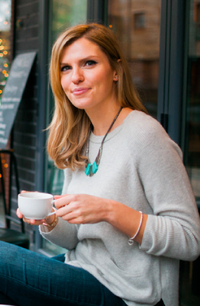How to stop a panic attack, from women who have learned to live with them
Three women share how to stop a panic attack from taking over citing their own personal coping strategies
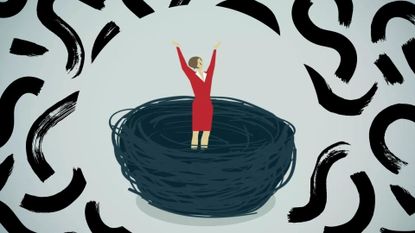

Experiencing a panic attack can be completely terrifying, but there are ways to calm your body when the panic starts to rise. A sudden rush of adrenaline, coupled with debilitating symptoms, can leave a sufferer feeling scared, disorientated, and subsequently exhausted. We asked three women how to stop a panic attack with methods they've honed over years of suffering from extreme anxiety.
As a society, we’re talking about mental health—including more niche conditions like sleep anxiety and sexual anxiety—more than ever before, with celebrities championing conversation around panic disorder. If you’re prone to panic attacks, you’re not alone. 13.2% of people will experience a panic attack in their lifetime according to the Mental Health Foundation.
The NHS cites panic disorder as the most severe form of anxiety, and can “create a cycle of living in fear of fear”. Nadiya Hussain's recent documentary, Nadiya: Anxiety and Me, documents the TV chef's quest to find treatment to cope with her own "crippling" anxiety. She says of panic attacks, “it feels like you’re going to die. Your airways close up. Your head spins. You collapse. It’s so scary”.
Journalist Bella Mackie’s bestselling memoir, Jog On, highlights how exercise can be a lifeline for those suffering from anxiety and panic attacks, which were, for Bella, “physically brutal”. When the moment strikes, it's easy to think, as Bella Mackie writes, "I can't possibly get through this". So how do you? If you're prone to panic attacks, know you're not alone—and equip yourself with these coping strategies from learning how to breathe better to mastering good sleep hygiene.
How to stop a panic attack—three women share their strategies
While experiencing a panic attack can be an unsettling experience, there are coping mechanisms that can help prevent the attack from escalating, from breathing techniques for anxiety (take a look at our guide on the Wim Hof breathing technique for some more detailed info on the Wim Hof method) to mindfulness practices.
“I remember during the first attack there an extreme awareness of my heart. All of a sudden, I couldn’t breathe and I was convinced I was having a heart attack. I felt overwhelmed and couldn’t stabilize. It was horrific. I only really learned how to stop panic attacks when I delved into why my anxiety was there in the first place. If you want to deal with the root of a panic attack, accept that it’s often down to something else going on in your life; grief, or stress, perhaps. Reach out to someone—whether that’s a loved one, close friend, your doctor, or a professional—as it’s so important to talk.
"At this moment, breathing is so important"
“An attack can bring back uncomfortable and familiar memories of previous panic attacks. When you feel the memory creeping back up, let it wash you until you feel safe, repeating ‘I am safe, I am fine’. Overcoming a panic attack involves a lot of positive self-talk; a strong mental attitude is key. At this moment, breathing is so important. Many people get it wrong when it comes to breathing to calm the system down. The exhale needs to be longer than the inhale by one count to engage the relaxation response. An easy technique to remember is 3-4-5; breathe in for 3, hold for 4, then breathe out for 5.
Sign up for the woman&home newsletter
Sign up to our free daily email for the latest royal and entertainment news, interesting opinion, expert advice on styling and beauty trends, and no-nonsense guides to the health and wellness questions you want answered.
"Another technique that will work quickly is a technique called EFT, which involves tapping on meridian points in order to relax the body. EFT points include the collar bone, under the nose, under the eye, the side of the eye, and the chin."
"I actually first experienced a panic attack at the age of eight years old. But I only know this because when I subsequently had panic attacks in my adulthood and was then diagnosed with panic disorder and generalized anxiety disorder in my 20s. It was during regression hypnotherapy I discovered the learned feeling went back to when I was eight and got trapped in a swimming pool. My panic attacks in my adulthood started when I was 25 and fronting a kids TV show for ITV, it was a terrifying time as I didn’t know what was wrong with me and what I was experiencing.
"There is only so long someone can cope with that intense adrenaline and fear coursing around their body. As is common with mental health issues, I started to experience other side effects such as insomnia and loss of appetite. In the end, I had a breakdown at work and willingly went to see my doctor for help.
"If you feel a panic attack coming on, get yourself in a safe place, ideally sitting down and breathe in for five seconds through your nose and out for five seconds for your mouth. Tell someone what you are experiencing so they can help you if need be. Let the attack pass, which it will, and make sure you just take the rest of the day easy as it can be exhausting.
"General relaxation techniques day-to-day can be a game-changer"
"I am a big fan of talking therapies, but also medication where appropriate as well. I believe that medication should always be supported with therapy of some kind to get to the root cause of the issue—and to learn coping strategies and techniques. A combination of cognitive behavioral therapy, neuro-linguistic programming, hypnosis, and mindfulness is what I find to be really effective. Also learning about who you are, what your triggers are, and what you need to do to help keep yourself well is key. General relaxation techniques can be a day-to-day game-changer."
Chloe Brotheridge suffered panic attacks in her teens and has written two books, The Anxiety Solution and Brave New Girl, providing practical solutions for mental health issues in a relatable way. She wants to share her own experiences to help others cope with their anxiety and reduce the stigma around panic disorder.
"I had my first panic attack at 15. I thought I was dying and begged my friend to take me to hospital. At a later date, I had a panic attack during a presentation, where I felt as though I'd come out of my body and was watching myself from the ceiling. My main piece of advice would be to remind yourself that although panic attacks are scary, they are not dangerous; it's just adrenaline and it can't hurt you."
"The more you resist a panic attack, the more panicked you become."
"Try and float the panic attack rather than fighting against it. The more you resist a panic attack, the more panicked you become. I use a technique called grounding. It's where you notice what you see around you, feel, smell and hear. This grounds you and brings you back to your body. Worry and anxiety can be exhausting. I set up my website Calmer You to try and help people suffering from anxiety and panic attacks find solutions that work and overcome these issues."
Why do panic attacks happen?
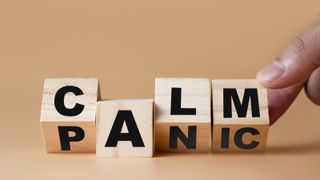
While many of us are all too familiar with the effects of a panic attack—but what causes them in the first place? According to Abbas Kanani, superintendent pharmacist and medical advisor at Chemist Click, the root cause is still unsure. "It’s not well known what actually causes panic attacks, however certain factors and triggers play a key role, these may be linked to mental health, stress, anxiety, or even genetics," he told w&h. "Panic attacks affect everyone differently and will be experienced differently. Your body essentially goes into fight or flight mode and you may experience physical symptoms that make you feel as though you can’t breathe or have a feeling of impending doom."
Dr Hana Abu-Hassan, a specialist in family dynamics and mental health working at Chelsea Pharmacy Medical Clinic, argues that our biological makeup plays a big role. "We know for certain that some people are more prone to have panic attacks than others. Panic attacks can be genetic and run in families, too. Moreover, some individuals are more biologically prone to get them.
"But stressful environments, in general, can be held accountable, as well as major life events—such as changing jobs, divorce, marriage, new beginnings, sexual assault, history of physical abuse, loss of a loved one, too much caffeine consumption can even cause a panic attack."
What does a panic attack feel like?
A panic attack is a sudden feeling of intense fear or discomfort that reaches a peak within a short space of time, accompanied by physical symptoms such as dizziness, shaking, nausea and breathlessness. In severe cases, the sufferer may believe he or she will collapse or is about to die. Panic attacks can last anything from a few minutes to an hour.
"In a nutshell, research suggests that symptoms stem from the natural fight-or-flight response to danger. Symptoms vary and they could be coming from the heart, where one feels a racing or pounding heartbeat," Dr Hana Abu-Hassan told us. "Some start getting dizzy or feel faint. Others report feeling hot or cold, and even start sweating. Lots of people shake, tremble and develop tingling in the hands and feet. Some people complain of chest and abdominal pains and can even become short of breath. Some people describe it as an ‘out of body experience’."
What are the common panic attack symptoms?
"Panic attack symptoms come uninvited and are of sudden onset usually. They are intense and trigger heightened physical symptoms, without any direct cause of note. They can be quite fear-provoking and alarming," Dr Abu-Hassan told us.
The NHS cites that panic attack symptoms can include, but aren’t limited to:
- A racing heartbeat
- Tension headaches
- Sweating
- Nausea
- Chest pain
- Shortness of breath
- Trembling
- Shaky limbs
- A choking sensation
- Dizziness
- Pins and needles
- A dry mouth
- Feelings of dread or fear of dying
- A choking sensation
- A churning stomach
- Tingling sensations
How to prevent panic attacks happening in the future
There are certain lifestyle changes you can make in order to lessen your chances of experiencing a panic attack. “You need to work out what particular stress you might be under that could make your symptoms worse,” explains Professor Salkovskis, Programme Director for the Doctorate in Clinical Psychology (DClinPsy) at the Oxford Institute for Clinical Psychology, on the NHS website.
NHS guidelines state that these lifestyle habits can help prevent future panic attacks from recurring by reducing stress levels:
- Breathing exercises every day
- Regular exercise, particularly aerobic exercise
- Regular meals to stabilize blood sugar levels
- Avoid caffeine, alcohol, and smoking when possible
Meditation and mindfulness practices can also help—and you could try calming activities that encourage you to be present in the moment in order to build your mindfulness muscle. Take a look at our list of popular hobbies for women if you for some ideas on what you could try, including knitting, yoga for beginners, and Nordic Walking.
Medical treatment for panic attacks
NHS guidelines suggest cognitive behavioral therapy (CBT) as a way to ease panic attacks, panic disorder, and anxiety. You can refer yourself directly to a psychological therapist, without seeing your GP. Alternatively, your GP can refer you.
Several types of medication have been shown to be effective in managing symptoms of panic attacks, including selective serotonin reuptake inhibitors (SSRIs) and serotonin and norepinephrine reuptake inhibitors (SNRIs). Always consult a doctor if considering medication and be mindful of potential side effects.
w&h thanks Jane Sorrell of janebliss.com, Anna Williamson, Chloe Brotheridge, Abbas Kanani, superintendent pharmacist and medical advisor at Chemist Click, and Dr Hana Abu-Hassan, a specialist in family dynamics and mental health working at Chelsea Pharmacy Medical Clinic for their time, expertise, and guidance.
Lauren is the former Deputy Digital Editor at woman&home and became a journalist mainly because she enjoys being nosy. With a background in features journalism, Lauren worked on the woman&home brand for four years before going freelance. Before woman&home Lauren worked across a variety of women's lifestyle titles, including GoodTo, Woman's Own, and Woman magazine.
-
 Incredible film locations to inspire your next getaway - from the tropical landscapes of Sri Lanka to the deserts of Jordan
Incredible film locations to inspire your next getaway - from the tropical landscapes of Sri Lanka to the deserts of JordanThese inspiring destinations are begging to be explored...
By Lydia Swinscoe Published
-
 5 budget cleaning hacks to get your outdoor furniture summer-ready in no time
5 budget cleaning hacks to get your outdoor furniture summer-ready in no timeWant to revive your garden furniture in time for summer? Look no further than these budget cleaning hacks for as little as 30p
By Emily Smith Published
-
 How to use mindfulness to destress and appreciate the everyday
How to use mindfulness to destress and appreciate the everydayThese mindfulness tips from The Mindful Manifesto will help you de-stress and re-awaken your sense of being.
By Lauren Hughes Published
-
 5 easy ways to practise mindfulness in your daily life - and the brilliant physical benefits
5 easy ways to practise mindfulness in your daily life - and the brilliant physical benefitsIt can provide a range of benefits.
By Faith Hill Published
-
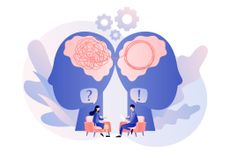 How to find a therapist that's right for you and a guide to the different types of talking therapies
How to find a therapist that's right for you and a guide to the different types of talking therapiesIt's an important decision - here are some things it can help to think about...
By Amy Hunt Published
-
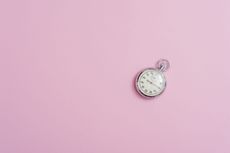 This is what hypnotherapy could do for your anxiety levels
This is what hypnotherapy could do for your anxiety levelsAnxiety is usually experienced by less than 10% of the UK population at any given time, but many are finding that their worries are becoming bigger than before.
By Grace Walsh Published
-
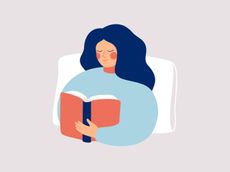 The simple trick to help you relax in just one minute
The simple trick to help you relax in just one minuteWe constantly make time for both friends and family. But when was the last time we made time for ourselves?
By Lauren Hughes Published
-
 Being kind to ourselves can reduce our stress levels - here’s how to practice it more in your daily life, according to a wellbeing expert
Being kind to ourselves can reduce our stress levels - here’s how to practice it more in your daily life, according to a wellbeing expertImportant information during Mental Health Awareness Week, if you're inclined to give yourself a hard time...
By Amy Hunt Published
-
 woman&home and TV's Anna Richardson partner to offer huge discount on online counselling – get private therapy for as little as £33!
woman&home and TV's Anna Richardson partner to offer huge discount on online counselling – get private therapy for as little as £33!Readers can get a brilliant discount of up to 50%!
By Mariana Cerqueira Published
-
 How to unpack your emotions - to make sure you're not suffering from 'compassion fatigue'
How to unpack your emotions - to make sure you're not suffering from 'compassion fatigue'It’s not always easy to recognise that we’re overloaded but knowing what’s weighing you down is the key to a lighter, happier life.
By Amanda Seyderhelm Published


